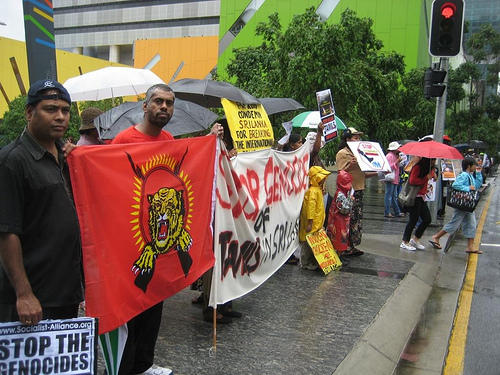
Why I Boycotted the Galle Literary Festival

Two weeks ago, Reporters sans frontières (RSF), on the instigation of Journalists for Democracy in Sri Lanka (JDS), called for a boycott of the fifth Galle Literary Festival. They sent a petition around, and Noam Chomsky and Arundhati Roy signed up. So did a bunch of other idiots. In it, they called on international authors who had agreed to travel to Sri Lanka to abort their journeys, claiming that it was wrong for literature to be celebrated in a country that killed its journalists. Three authors did; South African Commonwealth Writers Prize winner Damon Galgut, Turkish Nobel laureate Orhan Pamuk, and Indian Man Booker winner Kiran Desai. The rest came.
It’s wrong to do many things in a country that kills its journalists. It’s wrong to laugh, it’s wrong to be happy, it’s wrong to have celebrations of any sort. Christmas, Avurudhu, and Valentine’s should be boycotted. But what is right is to celebrate literature. How could the RSF and JDS get this so wrong?
Supporters of the boycott variously claim that the Galle Literary Festival has failed to speak out against the Big Bad Wolf from Madamulana who likes to eat journalists for lunch. Him and his wolfpack of brothers. They say that participants at the festival haven’t done their bit to call attention to the disappearance of cartoonist and columnist Pradeep Eknaligoda, or the murder of Sunday Leader editor Lasantha Wickramatunge, or even the killing of that Tiger, Dharmaratnam Sivaram. Last June, Sri Lanka hosted the International Surfing Association’s Pro 2010 event at Arugam Bay on the island’s east coast, in an area once dominated by the Liberation Tigers of Tamil Eelam. Well, to paraphrase Colonel Kilgore, Tiger don’t surf, and he’s history now. Over a hundred and twenty international competitors from New Zealand to Germany and from the USA to South Africa participated. No one boycotted that. Next month sees the start of the Cricket World Cup, with Sri Lanka hosting several matches which will be watched by at least a billion fans worldwide. No one has boycotted that either. Perhaps the RSF and JDS think that surfers and cricket fans are too dumb to care about media rights. Continue reading “Why I Boycotted the Galle Literary Festival”




